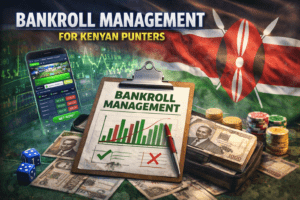
This guide will help you take control of your betting experience by effectively managing your bankroll in football betting. I will share vital strategies that can help you maximize your profits and minimize losses. Understanding how much money you should allocate for each bet is vital, as is setting limits to avoid overspending. With these tips, you’ll learn how to strike a balance between having fun and making informed decisions, ensuring your betting journey remains positive and sustainable.
Key Takeaways:
- Establish a dedicated bankroll: Set aside a specific amount for betting that you can afford to lose, separate from your regular finances.
- Implement a staking plan: Decide on a consistent percentage or flat amount of your bankroll to wager on each bet, helping to manage risk and maintain longevity.
- Track your bets: Keep detailed records of your betting history, including wins, losses, and strategies, to analyze your performance and adapt your approach accordingly.
Defining Your Financial Boundaries
Establishing clear financial boundaries ensures you stay within limits while enjoying football betting. It’s about taking a hard look at your finances and identifying how much you can comfortably allocate for betting without jeopardizing your financial stability.
Setting a Betting Bankroll Limit
A betting bankroll limit is the amount I’ve designated specifically for wagering, independent of my imperative living expenses. By setting this limit, I can ensure my betting activities remain enjoyable instead of turning into a source of stress or financial strain.
Prioritizing Necessary Expenses Over Betting
Before placing any bets, I assess my necessary expenses, such as housing, groceries, and bills. This prioritization is fundamental because it protects my financial well-being and assures that betting doesn’t impact my ability to meet basic needs. Even with a dedicated bankroll, if it means dipping into funds needed for imperative expenses, it’s time to reassess my betting limits. I remind myself that the excitement of betting should not come at the cost of my financial security.
The Art of Stakes Management
Mastering stakes management is crucial for long-term success in football betting. By controlling your bet sizes and making informed decisions based on your bankroll, you can protect yourself from significant losses while maximizing your potential for profit. It’s about finding the right balance and staying disciplined as you navigate the ups and downs of betting. This section will provide insights into how to effectively manage your stakes, ensuring that your betting strategy aligns with your financial goals.
Choosing the Right Bet Size
Selecting the appropriate bet size is fundamental to maintaining a sustainable bankroll. Instead of betting large amounts on a single wager, I opt for a more conservative approach, generally placing bets between 1% and 5% of my total bankroll per wager. By adhering to this strategy, you minimize the risk of depleting your funds too quickly and allow for a more organized betting experience. This disciplined method helps keep my emotions in check and allows room for growth.
Establishing a Unit System for Consistency
Implementing a unit system is a systematic way to ensure consistency in my betting approach. Each unit represents a fixed percentage of my bankroll, which helps standardize my bets regardless of how much my bankroll fluctuates. For example, if I designate my unit size as 1% of my bankroll, and my total bankroll is $1,000, each unit equals $10. As I adjust my bankroll, my unit size changes accordingly, keeping my betting strategy adaptive and aligned with my financial standing.
The beauty of a unit system lies in its ability to simplify decision-making under pressure. By allocating a specific amount of your bankroll per unit, you streamline the betting process, allowing for an automatic adjustment as your bankroll grows or shrinks. If I experience a winning streak, my unit size increases, giving me the confidence to place larger bets based on my elevated bankroll. Conversely, during losing periods, my stakes naturally decrease, protecting my funds and maintaining a level head. This system cultivates discipline while promoting effective long-term strategies in sports betting.
The Psychology of Betting Discipline
Maintaining discipline within your betting strategy hinges largely on understanding the psychological aspects of gambling. Emotional resilience can significantly impact your decision-making process, often leading you to stray from your predetermined betting plan. Cultivating discipline requires self-awareness and the ability to manage both your emotions and logical reasoning, ensuring that each bet aligns with your overall strategy rather than impulsive whims.
Recognizing Emotional Triggers
Identifying your emotional triggers can illuminate patterns in your betting behavior. For instance, do I often bet impulsively after a win, feeling overly confident? Or do I chase losses when I experience a string of defeats, hoping to recover finances through riskier bets? Recognizing these triggers allows me to draw clear boundaries, safeguarding my bankroll against emotional volatility.
Strategies to Stay Committed to Your Plan
Staying committed to your betting plan requires more than just willpower; it often calls for systematic strategies. Establishing strict limits on both time and money helps create a structured environment for betting. I also find it beneficial to keep a detailed betting journal, documenting my decisions and emotions connected to each wager. This practice not only cultivates self-awareness but also encourages reflection and accountability, making it easier to stick to my betting strategy even in the face of unfortunate losses or tempting wins.
A comprehensive approach includes setting clear, quantifiable goals, like outlining the percentage of your bankroll to wager on each bet. By adhering to a proportional betting strategy, I keep my bets manageable, thus preventing reckless behavior. Sharing your goals with a trusted friend or fellow bettor can add an element of accountability, providing a support system that reinforces commitment during challenging moments. Regularly reviewing my performance also keeps me aligned with my overall strategy, ensuring that I adapt based on outcomes while maintaining the discipline necessary for long-term success.
Shifting the Odds in Your Favor
In football betting, shifting the odds is about understanding the dynamics of the betting landscape. Being aware of market movements and betting trends allows you to spot opportunities where the odds may not accurately reflect the true probabilities of an outcome. By leveraging insights, forming strategies, and placing bets wisely, I can tilt the odds in my favor, ultimately increasing my chances of a profitable betting experience.
Analyzing Betting Markets and Odds
Analyzing betting markets and odds involves a thorough evaluation of how bookmakers set their odds based on public sentiment, team performance, and injuries. I regularly compare odds across different platforms to find discrepancies, as sometimes, mispriced odds present lucrative betting opportunities. This approach allows me to bet on outcomes that may be undervalued by the market.
Utilizing Data-Driven Decisions for Informed Betting
Data-driven decisions empower you to make informed bets by analyzing statistics and historical performance. By examining factors such as team form, head-to-head records, and critical player statistics, I can develop a clearer picture of potential game outcomes, enhancing my betting strategy.
Diving deeper into data-driven betting, I focus on various metrics such as expected goals (xG) and player efficiency ratings to gauge team strengths and weaknesses. For instance, if a top striker has an impressive xG but is facing a team with a weak defensive record, the chances of them scoring become more favorable. By integrating such statistics with historical performance and current form, I can create a comprehensive betting strategy that not only improves my odds but also allows me to back informed choices rather than rely solely on gut feelings or public opinion. Overall, the more data I analyze, the better positioned I am to make strategic bets that align with my bankroll management goals.
Adapting Your Strategies Over Time
Adapting strategies in football betting isn’t just beneficial; it’s necessary for long-term success. The sports landscape is ever-changing, with factors like team form, injuries, and coaching decisions evolving regularly. By remaining flexible and open to change, you can adjust your methods to reflect these dynamics and increase your chances of winning.
Reviewing and Adjusting Your Approach
Regular reviews of your betting strategy can help identify what works and what doesn’t. I schedule time after significant betting periods to analyze my results and reassess my strategies. This evaluation process is vital for adapting to new trends in the game and avoiding stagnation.
Learning from Wins and Losses: Creating a Feedback Loop
Evaluating both wins and losses creates a feedback loop that informs future betting decisions. I meticulously track my bets and outcomes, taking notes on the factors that contributed to success or failure. This not only improves your understanding of football betting but also helps fine-tune your strategy.
Diving deeper into the feedback loop, consider adopting a journal or digital tracking tool to record details such as betting type, odds, and post-match analyses. By analyzing patterns in your bets, I can spot what strategies yield higher returns and which ones drain my bankroll. For instance, you might find that betting on home teams offers better value based on historical performance. Adjusting your approach based on thorough post-analysis will improve your results and confidence in your betting strategies over time.
To wrap up
Ultimately, managing your bankroll in football betting is about discipline and strategy. I believe that by setting a clear budget, tracking your bets, and making informed decisions, you can keep your betting experience enjoyable and less stressful. It’s important to stick to your plan, take breaks when needed, and avoid chasing losses. By applying these practices, you empower yourself to make smarter choices, ensuring that your football betting remains a fun and engaging activity without jeopardizing your financial well-being.






